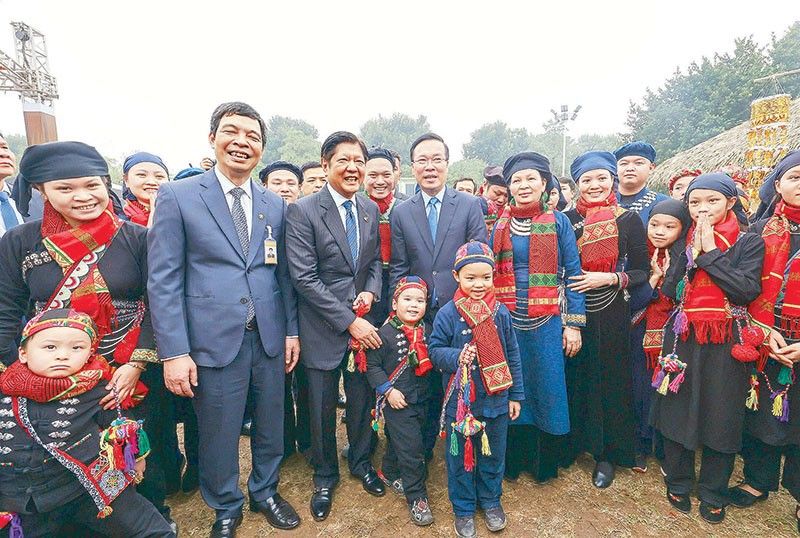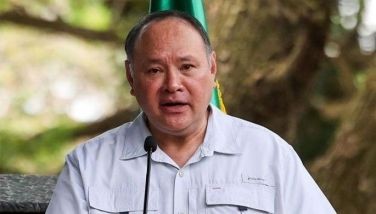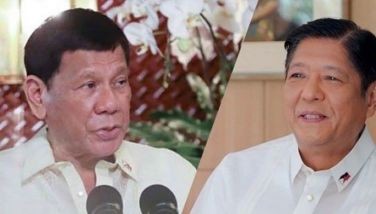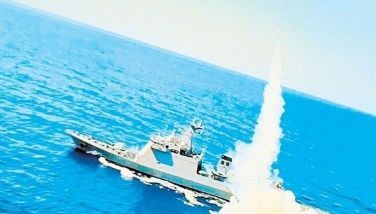Philippines, Vietnam to boost SCS cooperation, incident prevention

HANOI – The Philippines and Vietnam yesterday agreed to boost cooperation between their coast guards and to prevent untoward incidents in the disputed South China Sea in light of Beijing’s continued aggression in one of the world’s most important trade routes.
In separate meetings with Vietnamese President Vo Van Thuong and Prime Minister Pham Minh Chinh here yesterday morning, Marcos cited China’s “illegal actions” in the West Philippine Sea despite Chinese President Xi Jinping’s promise to de-escalate tensions in the disputed waters.
Marcos and Thuong witnessed the exchange of notes between the Philippine Coast Guard (PCG) and the Vietnam Coast Guard (VCG), on maritime cooperation and understanding on incident prevention and management in the South China Sea between their ministries of foreign affairs at the Presidential Palace.
The Philippines and Vietnam also have competing claims over the South China Sea, believed to have large reserves of oil and gas.
Marcos is in Vietnam for a two-day state visit. He is scheduled to return to Manila early today.
“On the South China Sea, I am pleased that our ministries of foreign affairs have signed the memorandum of understanding (MOU) on incident prevention and management in the South China Sea. I hope that we can seriously implement this agreement as quickly as we can,” Marcos said during his meeting with Chinh at the Grand Hall of the Government headquarters.
On incident prevention and management in the South China Sea, the Philippines and Vietnam agreed to enhance coordination regarding maritime issues bilaterally, within the Association of Southeast Asian Nations and with other dialogue partners, with both sides intensifying efforts to promote trust, confidence and understanding, through dialogue and cooperative activities.
The MOU on maritime cooperation, on the other hand, seeks to strengthen the understanding, mutual trust and confidence between the two parties through development of a Joint Coast Guard Committee to discuss common issues and interests between the PCG and VCG.
“This memorandum aims to establish a comprehensive partnership between our coast guards on capacity building, training and personnel and ship exchanges to enhance interoperability operations between our two countries,” Marcos said.
He added that the memorandum of agreement (MOA) on search and rescue at sea signed in 2010 between the PCG and VCG should be reviewed “to enhance cooperation through liaising capability, coordination through skills development of our coast guards, amongst others, with the objective of conducting a collaborative exercise sometime in this year.”
The MOA on the establishment of hotline communication mechanism signed in 2011 between the PCG and VCG should be strengthened through the use of digital platforms, according to the President.
Marcos said that he and Xi had agreed on the importance of de-escalating tensions in the South China Sea during their meeting on the sidelines of the Asia-Pacific Economic Cooperation Leaders Meeting in November last year.
Marcos also recalled his state visit to China last year, where he reaffirmed with Xi that maritime issues should not constitute the relations between the Philippines and China, and that the two countries should work to enhance comprehensive strategic cooperation.
China, however, appears to continue its illegal activities in the South China Sea, according to Marcos.
The President cited the Dec. 9 and 10 incidents last year, where Chinese Coast Guard (CCG) and Chinese militia used water cannons to obstruct Philippine vessels in Panatagt and Ayungin Shoals, respectively.
He said that the Philippine vessel, which was undertaking a legitimate and routine resupply mission in Ayungin Shoal, was damaged.
“We are firm in defending our sovereignty, sovereign rights and jurisdiction against any provocations. But at the same time, we are also seeking to address these issues with China through peaceful dialogue and consultations as two equal sovereign states,” he added.
The Philippines’ position on the South China Sea row has been consistent, clear and firmly anchored on the 1982 United Nations Convention on the Law of the Sea, according to the Chief Executive.
“We are committed to work in partnership with other like-minded states to ensure a rules-based international order in the Asia-Pacific region governed by international law,” he said during his meeting with the Vietnamese prime minister.
Marcos also told the Vietnamese president during their meeting at the Presidential Palace that “it is imperative to the Philippines and the world that sailing and air traffic over the South China Sea remain free for the large amount of trade that goes through those areas.”
In November last year, Marcos said that the Philippines is negotiating a separate code of conduct in the disputed South China Sea with Vietnam and Malaysia as he expressed dismay over the “slow progress” in forging a COC between the ASEAN and China.
China, however, pushed back against the idea of a separate COC among claimant states.
Chinese Foreign Ministry spokesman Mao Ning has warned that “any departure from the DOC framework and its spirit will be null and void.”
Mao was referring to the 2002 Declaration on the Conduct of Parties in the South China Sea, which does not provide sanctions and has failed to stop Chinese aggression in the contested waters.
Since 2002, the ASEAN has been seeking to obtain China’s consent to a binding COC in the South China Sea.
Balikatan
In another development, the Armed Forces of the Philippines (AFP) has begun preparations for this year’s 39th iteration of the Balikatan that will again see thousands of American and Filipino soldiers train shoulder-to-shoulder on Philippine soil.
For this year’s drills, however, the military yesterday announced that bigger and better series of events are to be expected in April, which will now include cyberspace and information warfare.
“The difference now (from) last year’s Balikatan is we are going to have more exercises in key positions all over the country. Aside from quantity, we will heavily lean toward quality trainings. We will build upon the success of the last Balikatan, so for every Balikatan that we are doing, we are doing things a little differently,” AFP spokesperson Col. Francel Margareth Padilla, told reporters.
“We are adding some more challenges, some more complexity toward the exercise. Aside from kinetic activities and littoral airspace and landspace, we will also be doing exercises in the non-physical domain, such as cyberspace and information warfare,” Padilla said.
She noted that this year’s events are still in the planning stage and not many details can be shared yet, but 2024 will definitely be “bigger than last time and involving more key positions.”
A cybersecurity expert herself, Padilla said this year’s Balikatan would have more focus on cyber operations, along with the usual maritime and aerial exercises.
Philippine Navy spokesman for the West Philippine Sea Commodore Roy Vincent Trinidad said details on sizes, locations and the like are still being finalized, but said that this year’s events will be a mixture of everything and will be “an improved version from the last exercise.”
“That’s our objective – to keep on improving and keep on challenging the Armed Forces on its capabilities on how we could surpass these particular challenges,” Trinidad added.
Last year’s Balikatan was deemed the biggest so far, with 17,600 Filipino and American troops participating and the Australian Defense Force joining some of the events.
The Japan Self Defense Force also acted as observers last year, which saw live-fire events, military drills, learning exchanges and humanitarian assistance and disaster response activities.
Last year’s Balikatan was highlighted by major training exercise in the waters of Zambales facing the West Philippine Sea/South China Sea, where the AFP teamed up with the US military in sinking an “enemy” ship using ground, sea and air assets. — Michael Punongbayan
- Latest
- Trending



























